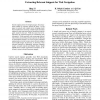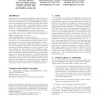504 search results - page 71 / 101 » Determining the user intent of web search engine queries |
CIKM
2011
Springer
12 years 8 months ago
2011
Springer
Traditionally, search engines have ignored the reading difficulty of documents and the reading proficiency of users in computing a document ranking. This is one reason why Web se...
AAAI
2008
13 years 11 months ago
2008
Search engines present fix-length passages from documents ranked by relevance against the query. In this paper, we present and compare novel, language-model based methods for extr...
SIGIR
2008
ACM
13 years 8 months ago
2008
ACM
Searching for people on the Web is one of the most common query types to the web search engines today. However, when a person name is queried, the returned webpages often contain ...
CIKM
2005
Springer
14 years 2 months ago
2005
Springer
Depending on a web searcher’s familiarity with a query’s target topic, it may be more appropriate to show her introductory or advanced documents. The TREC HARD [1] track defi...
ER
2004
Springer
14 years 2 months ago
2004
Springer
The envisioned Semantic Web aims to provide richly annotated and explicitly structured Web pages in XML, RDF, or description logics, based upon underlying ontologies and thesauri. ...


